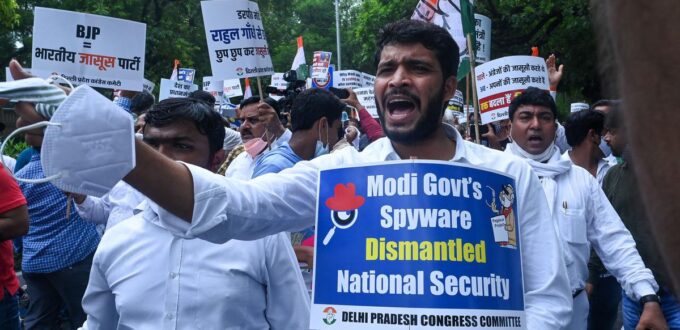India’s high court has requested a request by a free panel into whether or not the public authority utilized Pegasus observation programming for unlawful spying.
For the homegrown resistance, social liberties activists and the columnists who have been requesting such a request even with stalling by the public authority, Wednesday’s decision came as a triumph.
The board will involve three network protection specialists and its work will be administered by a resigned justice for the highest court. It will present its report in two months.
In reporting their choice, the appointed authorities reprimanded the public authority’s refusal to reveal, on the grounds of public safety, any subtleties of what the product was utilized for and why. They said Delhi had advertised “just an ambiguous … disavowal of charges”.
“The state can’t get a free sit back by raising public safety concerns. No omnibus preclusion can be called against legal survey,” the appointed authorities said.
Siddharth Varadarajan, the author proofreader of India’s non-benefit the Wire site that has worked with the Guardian on the Pegasus project, invited the choice. “It’s a decent beginning. The high court has properly would not accepting the public authority’s ‘public safety’ rationale,” he said.
The resistance in India has blamed the Narendra Modi government for treachery and “unpardonable blasphemy” over the reports from the Pegasus project uncovering that few writers, activists, and a political decision tactician had their telephone numbers remembered for an information hole of in excess of 50,000 numbers.
The accounts uncovered subtleties of many confirmed Indian telephone numbers that show up in the spilled records of numbers and incorporate that of the resistance chief Rahul Gandhi.
The Pegasus project, an examination concerning the Israeli spyware producer, NSO Group, was driven by a consortium of 17 media sources that incorporated the Guardian, Washington Post and the French charitable Forbidden Stories.
NSO has said its hacking programming is simply intended to be utilized by government customers to direct genuine examinations concerning genuine wrongdoing. The organization has said it conducts intensive examinations of charges of abuse when it gets “dependable data”.
The Indian government has said very little on the embarrassment, generally binding itself to blaming those making the charges for attempting to ruin the nation and censure Indian majority rules system with their “enemies of India plan”.
During prior hearings, the public authority had presented to shape its own board of specialists yet this was dismissed on Wednesday by the adjudicators, who started the meeting by taking note of the “Orwellian worries” about the abuse of innovation.
The adjudicators said unpredictable spying couldn’t be permitted and featured the “chilling” impact it could have on the right to speak freely of discourse and opportunity of the press.
They were constrained, they added, to “decide reality and make quick work of the issue”.


No Comments Yet